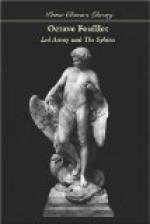And, he goes off for a hunt or a ride by the seaside. As to myself, preoccupied with the idea than I am expected, and satisfied that I shall be unable to do any further work of value, I soon resolve to go and join Madame de Malouet, whom I find deeply engaged in conversation with the parish priest, or with Jacquemart (of Bordeaux). She has disturbed me, I am in her way, and we smile pleasantly to each other.
Such is the manner in which the middle of the day usually passes off.
In the morning, I ride on horseback with the marquis, who is kind enough to spare me the crowd and tumult of the general riding-parties. In the evening, I take a hand at whist, then I chat a while with the ladies, and I try my best to cast off at their feet my bear’s skin and reputation; for I dislike to display any eccentricity of my own, this one rather more so than any other. There is in a grave disposition, when carried to the point of stiffness and ill-grace toward women, something coarsely pedantic, that is unbecoming in great talents and ridiculous in lesser ones. I retire afterward, and I work rather late in the library. That’s the best of my day.
The society at the chateau is usually made up of the marquis’ guests, who are always numerous at this season, and of a few persons of the neighborhood. The object of these entertainments on a grand scale is, above all, to celebrate the visit of Monsieur de Malouet’s only daughter, who comes every year to spend the autumn with her family. She is a person of statuesque beauty, who amuses herself with queenly dignity, and who communicates with ordinary mortals by means of contemptuous mono-syllables uttered in a deep bass voice. She married, some twelve years ago, an Englishman, a member of the diplomatic corps, Lord A——, a personage equally handsome and impassive as herself. He addresses at intervals to his wife an English monosyllable, to which the latter replies imperturbably with a French monosyllable. Nevertheless, three little lords, worthy the pencil of Lawrence, who strut majestically around this Olympian couple, attest between the two nations a secret intelligence which escapes the vulgar observer.
A scarcely less remarkable couple comes over to us daily from a neighboring chateau. The husband is one Monsiuer de Breuilly, formerly an officer in King Charles X’s body-guards, and a bosom friend of the marquis. He is a very lively old man, still quite fine-looking, and wearing over close-cropped gray hair a hat too small for his head. He has an odd, though perhaps natural, way of scanning his words, and of speaking with a degree of deliberation that seems affected. He would be quite pleasant, however, were it not that his mind is constantly tortured by an ardent jealousy, and by a no less ardent apprehension of betraying his weakness, which, nevertheless, is a glaring and obvious fact to every one. It is difficult to understand how, with such a disposition and a great deal of common sense, he has committed the signal error of marrying, at the age of fifty-five, a young and pretty woman, and a creole, I believe, in the bargain.




